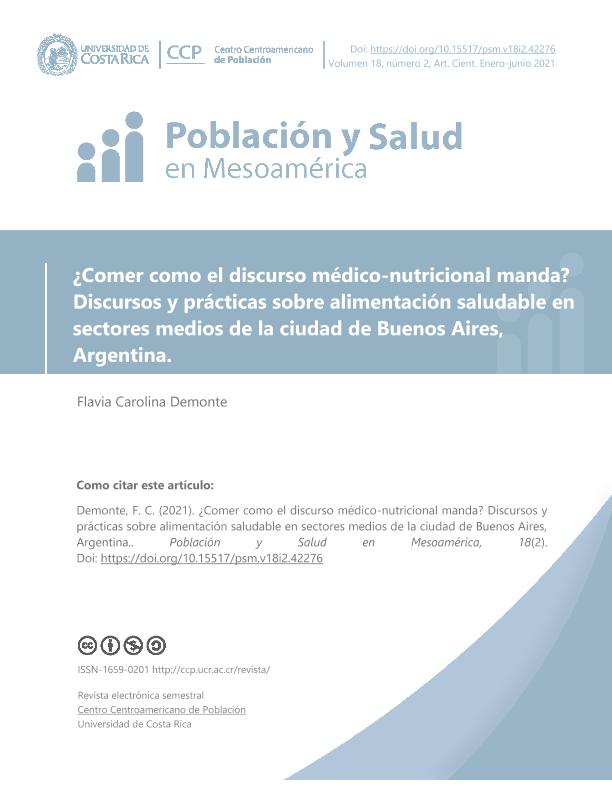Mostrar el registro sencillo del ítem
dc.contributor.author
Demonte, Flavia Carolina

dc.date.available
2021-10-28T20:29:53Z
dc.date.issued
2020-12-18
dc.identifier.citation
Demonte, Flavia Carolina; ¿Comer como el discurso médico-nutricional manda?: Discursos y prácticas sobre alimentación saludable en sectores medios de la ciudad de Buenos Aires, Argentina; Universidad de Costa Rica. Centro Centroamericano de Población; Población y Salud en Mesoamérica; 18; 2; 18-12-2020; 1-32
dc.identifier.uri
http://hdl.handle.net/11336/145412
dc.description.abstract
Objetivos: describir y analizar los discursos sobre alimentación saludable y su relación con las prácticas declaradas de integrantes de hogares con hijos/as que pertenecen a los sectores medios y que residen en la Ciudad Autónoma de Buenos Aires. Métodos: se utilizó un enfoque cualitativo, un tipo de estudio exploratorio-descriptivo y la técnica de relevamiento de la información fue la entrevista semiestructurada. Se seleccionaron intencionalmente 12 hogares pertenecientes a sectores medios que residen en la Ciudad Autónoma de Buenos Aires, integrados por parejas con hijas/os de diferentes edades. El procesamiento y análisis de la información fue realizado mediante la estrategia de análisis temático cualitativo. Resultados: se evidencia un discurso homogéneo sobre lo que se considera alimentación saludable, en función de las recomendaciones alimentarias vigentes independientemente de la edad y de vivir o no con sus hijos/as. Así como, una diversidad de prácticas de compra, preparación y consumo de alimentos. Esta diversidad se explica por la presencia de otros criterios que compiten con la búsqueda de alimentación saludable. Aunque se reconoce el efecto preventivo de la alimentación en relación con los problemas de salud asociados a esta, como el sobrepeso y la obesidad, emergen como los más enunciados y las explicaciones se asocian con la responsabilidad individual. Dos son las consecuencias más visibles de la divulgación y penetración del discurso médico-nutricional: reenviar al ámbito individual las prácticas alimentarias y del cuidado del cuerpo y omitir el peso del contexto y la responsabilidad colectiva en la explicación de los problemas de salud asociados con la alimentación actual.
dc.description.abstract
Objectives: To describe and analyze the discourses on healthy eating habits and their relationship with declared practices that hold middle-class parents who live in the Autonomous City of Buenos Aires, Argentina. Methods: A qualitative research was conducted, a type of exploratory-descriptive study and data was gathered with semi-structured interviews. Twelve households were intentionally selected, consisting of couples who had children of different age. A thematic analysis strategy was carried out to systematize and analyze the transcriptions. Results: A homogeneous discourse on healthy eating was observed, which is aligned with expert recommendations regardless of the interviewee´s age, whether or not they live with their children, and also their varied food purchasing, preparation, and consumption practices. The diversity observed in these practices can be explained by other criteria which compete with their quest for healthy eating. Even if the benefits of healthy eating to prevent food-related illnesses are recognized, overweight Objectives: To describe and analyze the discourses on healthy eating habits and their relationship with declared practices that hold middle-class parents who live in the Autonomous City of Buenos Aires, Argentina. Methods: A qualitative research was conducted, a type of exploratory-descriptive study and data was gathered with semi-structured interviews. Twelve households were intentionally selected, consisting of couples who had children of different age. A thematic analysis strategy was carried out to systematize and analyze the transcriptions. Results: A homogeneous discourse on healthy eating was observed, which is aligned with expert recommendations regardless of the interviewee´s age, whether or not they live with their children, and also their varied food purchasing, preparation, and consumption practices. The diversity observed in these practices can be explained by other criteria which compete with their quest for healthy eating. Even if the benefits of healthy eating to prevent food-related illnesses are recognized, overweight and obesity seem to prevail as the main reasons to choose what to eat, and individual responsibility is articulated. Two are the consequences of the diffusion and incorporation of the medical and nutritional discourse: first, to consider eating practices and body care as issues related to the personal realm; and, second, to leave out the weight that the social context and collective responsibility exert in the explanation of health problems associated with current eating habits.
dc.format
application/pdf
dc.language.iso
spa
dc.publisher
Universidad de Costa Rica. Centro Centroamericano de Población
dc.rights
info:eu-repo/semantics/openAccess
dc.rights.uri
https://creativecommons.org/licenses/by-nc-sa/2.5/ar/
dc.subject
ALIMENTACIÓN SALUDABLE
dc.subject
DISCURSOS Y PRÁCTICAS
dc.subject
SECTORES MEDIOS
dc.subject
ARGENTINA
dc.subject.classification
Nutrición, Dietética

dc.subject.classification
Ciencias de la Salud

dc.subject.classification
CIENCIAS MÉDICAS Y DE LA SALUD

dc.title
¿Comer como el discurso médico-nutricional manda?: Discursos y prácticas sobre alimentación saludable en sectores medios de la ciudad de Buenos Aires, Argentina
dc.title
¿Eating as the medical-nutritional discourse orders?: Discourses and practices on healthy eating habits among middle-class sectors in the City of Buenos Aires, Argentina
dc.type
info:eu-repo/semantics/article
dc.type
info:ar-repo/semantics/artículo
dc.type
info:eu-repo/semantics/publishedVersion
dc.date.updated
2021-09-29T17:02:22Z
dc.identifier.eissn
1659-0201
dc.journal.volume
18
dc.journal.number
2
dc.journal.pagination
1-32
dc.journal.pais
Costa Rica

dc.journal.ciudad
San José
dc.description.fil
Fil: Demonte, Flavia Carolina. Universidad Nacional de San Martín. Instituto de Altos Estudios Sociales; Argentina. Consejo Nacional de Investigaciones Científicas y Técnicas; Argentina
dc.journal.title
Población y Salud en Mesoamérica
dc.relation.alternativeid
info:eu-repo/semantics/altIdentifier/url/https://revistas.ucr.ac.cr/index.php/psm/article/view/42276
dc.relation.alternativeid
info:eu-repo/semantics/altIdentifier/doi/http://dx.doi.org/10.15517/psm.v18i2.42276
Archivos asociados
